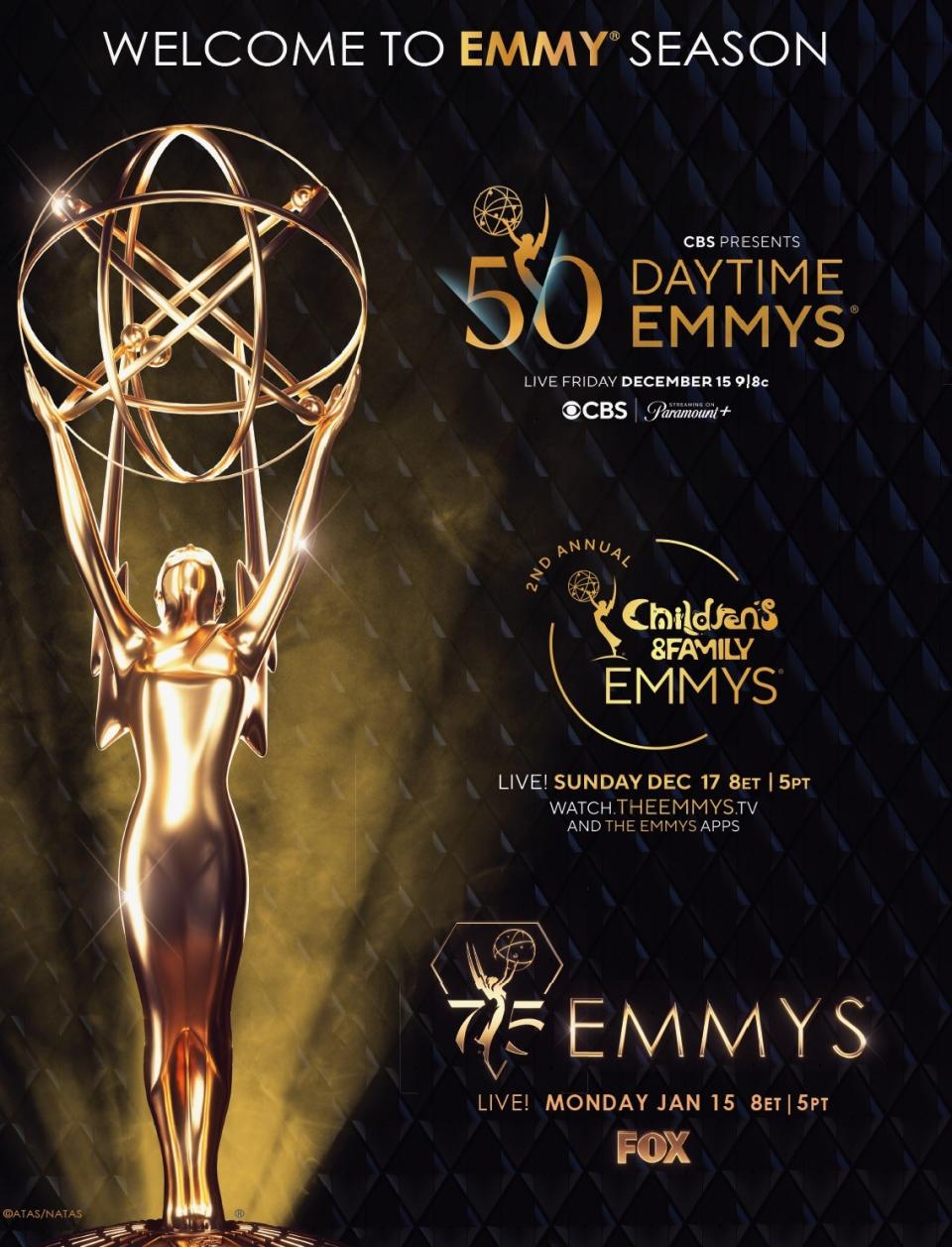Emmys Eligibility Calendars Won’t Change in 2024 Despite Strikes, But TV Academies’ Heads Expect Dip in Scripted Submissions

The two Hollywood strikes will have no impact on next year’s Emmy eligibility windows for either the Primetime Emmys or the Daytime Emmys, the heads of the two television academies confirmed this week.
Meeting with reporters in a joint setting — a collaboration that used to be a rarity, back when they were warring organizations, but has now become more common — Los Angeles-based Television Academy president/CEO Maury McIntyre and New York-based National Academy of Television Arts & Sciences president/CEO Adam Sharp tackled a wide range of subjects, including an anticipated drop in submissions next year in scripted categories due to the strikes; whether there will be more category realignments; if the talk show fields will be further adjusted; a major change in governance taking effect next year at NATAS; and more.
More from Variety
But they began by both confirming that they don’t expect to make any calendar tweaks to their Emmy competitions in the new year. Despite having to push this year’s Daytime Emmys from June to December and Primetime Emmys from September to January due to the strikes, that has had no bearing on actual eligibility for this year’s kudocasts or next year’s competitions.
That means the 2024 Primetime Emmy eligibility will stick with the June 1, 2023, to May 31, 2024, window. At NATAS, most of its awards (including the Daytime Emmys) function on a calendar year eligibility, keeping the next ceremonies’ submissions to programs that ran between January 1, 2023, and December 31, 2023. (The exception is NATAS’ Children’s & Family Emmys, which follows the Primetime Emmy window of June to May.)
“I’m not aware of the primetime competition changing its eligibility ever,” McIntyre said. “And we are not looking to do it this year. We feel — based on when the strikes did end and that production is starting, that you will see new seasons of a lot of our broadcast shows, and that a lot of the streamers and cables ended up still being able to deliver on some of their programs — that we will have a hefty competition keeping to our original eligibility.”
McIntyre added, however, that he expects to see a decrease in scripted submissions for the 2024 contest, much like the dip the Emmys saw in the first year of the pandemic.
“We’re modeling ourselves off of the pandemic year,” he said. “In essence, it was a similar shutdown during the pandemic. We saw about a 20% reduction in scripted submissions that following year and we fully expect we will see about a 20% — maybe even larger — reduction in scripted submissions for the upcoming competition in 2024. We don’t expect to see that in the reality and doc area, but we will probably see it in variety as well. So, we will probably be a little bit harder hit than we were in the pandemic. But I am seeing a lot of new content already out there and I certainly heard from all of our network partners that they are getting up as quickly as possible to get their shows launched.”
If anything, McIntyre said he believes the dip in output from streamers and cablers might give broadcasters a chance at more representation at next year’s Emmys.
At NATAS, Sharp noted that the majority of programs and genres in its Emmy kudocasts were non-struck productions. News and Doc, as well as Sports, weren’t impacted, which is why those ceremonies took place as normal in 2023. At the Daytime Emmys, WGA programs were impacted, but most fall under SAG-AFTRA’s Network Code contract. Children’s & Family Emmys was perhaps the most impacted by the strikes, but “it’s still a minority of the content in the competition,” Sharp said. “About a third of the content on the competition was subjected to one or both strikes this year. That was looking at this year’s submissions. Given that the majority was non struck, I feel like we should be in good shape to be on the same calendar next year.”
One change to the scheduling of the Children’s & Family Emmys is that NATAS plans to hold the third annual event in early 2025, rather than in December 2024.
“The feedback from the Children’s community has been a desire to have the ceremony was on the other side of the holiday season,” Sharp said. “So rather than being December 2024, it will probably be after the Critics’ Choice and Golden Globes, but before we get into Oscar season. So mid-January to early February 2025. That way we’re not killing a weekend in everyone’s holiday party season.”
Variety held the first joint interview between Sharp and McIntyre in November 2020 — a major milestone in ending the war between the two major TV academies. After a rift between the two coasts forced a split in 1977, the rivals spent decades battling each other (including in court) over which has jurisdiction of the Emmy Awards.
Now, the two sides are working closely as they realign awards to better fit the different Emmy ceremonies. In one major step the L.A. TV Academy sent all of its children’s categories from the Primetime Emmys over to NATAS, which then combined them with the kids categories in the Daytime competition to create the Children’s & Family Emmys, about to hold its second annual event next weekend.
On the flip side, NATAS sent its Daytime Emmy game show categories over to Los Angeles, where gamers are now a part of the Primetime ceremony, regardless of time slot.
“That was very much the groundbreaking moment with the Daytime/Primetime realignment, when we got to the genre-based categorization instead of daypart,” Sharp said.
That doesn’t mean it’s all been resolved as of yet. A panel is in place with reps from both academies to determine where content might land when a show straddles between eligibility in two different Emmy contests. (That has particularly been the case with figuring out what shows go to Children’s & Family vs. Primetime).
Talk series is another arena that still finds itself in both Primetime and Daytime, and so far those categories are still adhering a bit more to their dayparts. As of now, McIntyre said there’s no plan to make any immediate tweaks in the Primetime competition following the TV Academy’s decision this year to evolve its variety talk and variety sketch categories into outstanding talk series (“unscripted interviews or panel discussions between a host/hosts and guest celebrities or personalities”) and outstanding scripted variety series (“programs that are primarily scripted or feature loosely scripted improv and consist of discrete scenes, musical numbers, monologues, comedy stand-ups, sketches, etc.”).
“We made a change in the Television Academy competition this year, and we want to see how that plays out,” he said. “We haven’t even yet seen the winners of that change. Unfortunately, we then entered into a year with major strike action. So, I don’t think that we’ll want to make another change yet until we give it a couple more years, to see how it all kind of lands after the dust settles from the strikes. But it is definitely something we have to look at.”
The biggest remaining confusion, however, may be with documentaries. There are several doc categories in the Primetime Emmys, but NATAS also awards a slew of documentary prizes in its News & Doc ceremony.
“The lines there are a little bit more blurry,” Sharp said. “But these frameworks that we’ve developed through these Children’s & Family and Daytime exercises, give us a template to follow.”
Will documentaries eventually all be consolidated into one ceremony? McIntyre said it’s still under consideration.
“That is one question that we are asking our own community, do we want to combine all of that together into an even uber News & Doc Emmys that incorporates some of NATAS and some of what the Television Academy does?” McIntyre said. “We just haven’t come to a resolution yet as to what that should look like. But that is possible, what could happen is much like we carved out Children’s & Family as its new big [ceremony], we might evolve the News and Doc side of things.”
Meanwhile, at NATAS, Sharp is also preparing for a major governance change in the make-up of the org’s board. Having been governed by a “Board of Trustees” elected by its 19 regional directors, NATAS will now switch on Jan. 1 to a new board of directors that will eventually be elected through a national membership organized by peer group. In that vein, NATAS’ governing body will eventually be organized much like the Television Academy. That means representatives from Daytime, Sports, News and Documentary, Children’s & Family and Technology and Engineering will finally be represented on the NATAS board.
“We’ve been somewhat two organizations in one,” Sharp said. “We’ve been this national body with these national competitions and ceremonies. We’ve also been this association of 19 vibrant regional organizations. But in our governance model, those who participate in those national competitions have not necessarily had a seat at the table in governing the organization that oversees them. That has been at various points, one of those sources of tension between the two academies. I think this change will give a big opportunity to further strengthen the relationship between the academies… It’s a sign of the progress we have made.”
The idea of merging the two TV Academies, although often discussed, is still not in the cards — at least, any time soon. But as a sign of the continued goodwill between the TV Academy and NATAS, the orgs have come together for its first-ever joint print ad promoting the upcoming Daytime Emmys, Children’s & Family Emmys and Primetime Emmys (see below).

Best of Variety
Sign up for Variety’s Newsletter. For the latest news, follow us on Facebook, Twitter, and Instagram.

